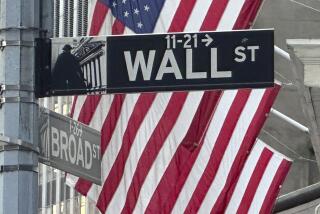Fed Chief’s Comments, New Data Hit Stocks
- Share via
Stocks slid Friday as Federal Reserve Chairman Alan Greenspan sounded one of his sternest warnings yet on a potential housing bubble, and as new data showed a larger-than-expected drop in consumer confidence.
The Fed chief’s comments, delivered at a conference in Jackson Hole, Wyo., were viewed as a strong suggestion that the central bank would continue to tighten credit. Shares of home builders, banks and other interest-rate-sensitive sectors helped to lead broad market indexes to seven-week lows.
The consumer confidence numbers, meanwhile, triggered fresh selling in the retail sector.
“Consumers are beginning to feel the impact of higher oil prices in their pockets,” said Larry Peruzzi, a trader at Boston Co. Asset Management.
The Dow Jones industrial average fell 53.34 points, or 0.5%, to 10,397.29. The Standard & Poor’s 500 dropped 7.29 points, or 0.6%, to 1,205.10, and the technology-heavy Nasdaq composite lost 13.60 points, or 0.6%, to 2,120.77.
All three indexes ended at their lowest levels since the week of July 4.
For the week, the Dow was down 1.5%, the S&P; 500 slid 1.2% and the Nasdaq fell 0.7%.
Late in the session, stocks trimmed some of the day’s losses after near-term crude oil futures fell $1.36 to $66.13 a barrel in New York, as traders bet that Hurricane Katrina would miss the heart of U.S. oil and natural gas production in the Gulf of Mexico.
But oil still was up 1.2% for the week. It closed at a record $67.49 a barrel Thursday.
In his comments, Greenspan did not use the term bubble in referring to housing, but he said rising asset values showed investors were taking on more risk. He said the Fed was closely watching asset prices in setting policy.
Some analysts said the Fed chief was signaling that the central bank’s key short-term rate, now at 3.5%, would continue to rise for the rest of this year.
“From his comments, it is clear that the Fed will keep raising rates, hoping to bring the housing market to a very soft landing,” said Drew Matus, economist at Lehman Bros.
Shorter-term Treasury bond yields, which are sensitive to Fed rate expectations, rose sharply after declining for most of the last few weeks. The two-year T-note yield ended at 4.06%, up from 4.0% on Thursday.
But longer-term yields were only modestly higher. The 10-year T-note finished at 4.18%, up from 4.16% on Thursday.
Bond yields might have been expected to decline Friday after the University of Michigan said its August consumer sentiment index was 89.1, down from 96.5 in July. If downbeat consumers rein in spending, they could trigger an economic slowdown -- which normally would put downward pressure on bond yields.
Among the day’s market highlights:
* An S&P; index of home builder stocks dropped 1.4%, bringing its slide in August to 14%. D.R. Horton, the biggest U.S. home builder, fell 81 cents to $34.40. Westwood-based KB Home retreated 96 cents to $70.09 and Toll Bros. dropped $1.35 to $46.75.
* An S&P; index of bank stocks slid 1.2% and was the biggest contributor to the S&P; 500’s decline, on concerns that higher interest rates could slow loan demand, particularly for mortgages. Wells Fargo lost 78 cents to $58.79, FirstFed Financial of Santa Monica slid $1.75 to $56.60 and IndyMac Bancorp of Pasadena gave up 53 cents to $41.11.
* Retailers feeling the pinch included Chico’s FAS, down $3.09 to $33.98; Abercrombie & Fitch, off $1.33 to $57.39; and Kohl’s, down $1.64 to $54.85. But Wal-Mart rose 41 cents to $45.70.
More to Read
Inside the business of entertainment
The Wide Shot brings you news, analysis and insights on everything from streaming wars to production — and what it all means for the future.
You may occasionally receive promotional content from the Los Angeles Times.










